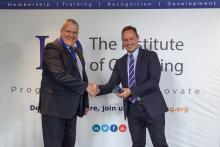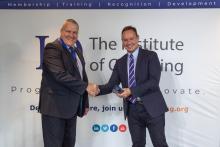
As a quarry manager Julian Smallshaw spent years at the rock face. Now he organises the education and training that helps others do the job. He talks to Patrick Smith
As a youngster, Julian Smallshaw was fascinated by rocks, and his local quarry offered the ideal place to indulge this passion.
It was while visiting the quarry that he was advised to send off a speculative job application. It paid off, and while he maintains the interest in mineralogy and geology, the one-time hobby turned into a career that now sees him with an impressive CV, and a job on the desk side of the quarry face.
A member of the
With a team of four, he is now responsible for a wide portfolio of quarry training and education modules for both organisations in the UK and more recently on a global scale.
“I have got two jobs. My time is spent equally between training and education for the IQ and I am general manager of MPQC, which is split into two sections: one is an awarding organisation and the other is the Skills Centre, which is the training section of the business. I look after this part of the business, and we deliver training to the mining and quarrying sector.”
Born in Burbage, near Hinckley, County Leicestershire, his interest in mineralogy and geology started at a very early age.
“My local quarry was Croft Quarry (ECC Quarries at that time). There was a very eager young assistant manager at the quarry, Julian Cleeton (a specialist in blasting who is still well known in the industry).
“He got me interested in the aggregates business and quarrying, and later he suggested that I phone some companies and see if they were going to take on a trainee. I was 17 at the time and after writing to ARC [
“This was followed by an HND (Higher National Diploma) in Quarry Engineering from Doncaster College (1982-1985) and a BSc in Quarrying degree from the University of Leeds in 1986.”
During this time Julian had various jobs including being manager at a sand and gravel pit in the Fens [an area of eastern England] and then as assistant unit manager at Tytherington Quarry, a large limestone quarry in the West Country [of England].
He held a number of area managerial positions in sand and gravel and hard stone operations throughout the UK. In 2005 he left the company to take up a post of operations manager in the United Arab Emirates (UAE) with
“We had three quarries and my job was to run one of the largest quarries producing 12 million tonnes a year. Many of the construction materials went into Dubai.”
After two years, he moved back to the UK to become a manager at Ennstone in charge of the Breedon and Cloud Hill Quarries between 2007 and 2009, gaining the SHE NVQ 5 Safety Health and Environmental Management in Extractives.
“I got to know that Jack Berridge [executive director at the Institute of Quarrying] was looking for someone to take on responsibility for e-learning and converting university diploma materials in quarry technology to an e-learning basis.
“This moved into other things. Hence my involvement in developing various knowledge-based qualifications through the University of Derby and assisting the university in whatever way we could.
“The IQ has always held the belief that education and training is a lifelong opportunity which has to be viewed in the broadest terms starting with initial qualifications gained at college, university or through distance learning programmes and progressing to work-based Continuing Professional Development or CPD.”
Many people have associated the Institute of Quarrying with the DAPS (Doncaster Assisted Private Study) course, which originated in the early 1970s and soon became the industry standard knowledge-based route to management in the extractives sector.
In 2007, the DAPs course was replaced by the University of Derby Diploma in Quarry Technology, a three-year fully accredited national qualification utilising distance learning. This broke the long ties with Doncaster College although some of the original lecturers transferred to the new location.
In a bold move in 2009, IQ decided to pioneer the development of the Diploma materials into an e-learning format in order to provide students with a more immersive learning experience. From September 2009, all the quarry-specific Diploma units would be viewed in a web-based format.
“When I started at IQ, I initially spent quite a lot of time at the university but as the conversion process ended 18 months ago my time at the university is now more of liaison.
“As my job role has changed the proportion of time I spend there has changed, and although I don’t get involved in tutorials or lectures I am doing a guest lecture in Derby in March.
“The University of Derby qualifications are for those people who require knowledge-based qualifications.
“MPQC is a training organisation and can offer a whole portfolio of training.
“We also have a plant operator competency scheme and this is extremely popular and is the industry standard. The scheme is for assessing and training.
“We also undertake driver CPC training where we specialise in the Site Safety Awareness Scheme for hauliers working in the extractives industry.”
The IQ also offers training opportunities for CPD, which is an integral part of helping a person gain or maintain competence in their job.
The IQ is able to offer two routes to help employers maintain or improve CPD in the Workplace: the Blended Route (structured CPD) or Preferred Knowledge Only Route (informal CPD) Blended Training is a combination of different learning methods, techniques and resources and applying them in an interactively meaningful learning environment.
The IQ owns and manages its own Learning Management System (LMS), which hosts a range of web-based learning materials for the extractives industries. Units are available to view 24/7, and this ensures that the candidate can utilise the resource in a timely and cost effective way.
After a pre-determined period of access to the relevant unit, a student will attend a training day. During the training session units are displayed in PowerPoint format using fresh subject materials. This reinforces the learning experience and is known as the blended approach. The last stage includes an online assessment. Following successful completion, a certificate of ‘structured’ CPD is issued which will include the number of assessed hours. Any number of units can be chosen over any length of time.
“With our own LMS at the IQ we can also put together training packages for business, which result in extra CPD hours. We are doing quite a lot of work with
IQ is also maximising the use of diploma-based units.
“Since the move to Derby, several additional qualifications have been validated for specific industry use. These include the Certificate in Ready Mix Concrete and the Certificate in Construction Materials,” says Julian, who is also excited about two developments that took place in 2010.
The University Certificate in Quarry Studies allowed a five-module (one academic year) qualification to be made available to new entrants with the basis of the qualification being focused on quarry operations and heavily focused on UK-specific legislation and regulation.
“With competence playing such an important role in the industry, now is the time to provide a knowledge-based qualification aimed at personnel at supervisory level.”
The course does not give the necessary knowledge base required for quarry management competence (that is the role of the diploma together with vocational qualifications and CPD) but it provides a progression route for foremen/supervisors who would like to move to a manager’s position in the future.”
With globalisation and rationalisation of the quarry industry, the other development, about to start its third year, is the University Certificate in International Quarry Operations. The qualification is aimed at quarry managers operating outside the UK as well as equipment suppliers and consultants to the industry who need to develop a greater understanding of quarry operations.
“Existing diploma-based units have been adapted to an international environment by replacing UK legislation, regulation, custom and practice with international standards and accepted best practice. [Four web-based modules cover Quarry Development and Management Systems; Extraction and Processing; Operational best Practice, and Quarry Blasting].
“We had 11 students in the first year; 18 in the second year and we are about to launch it for the third year in March.
“We have already had students from India, Romania, Poland, Oman, Botswana, Ghana, Malaysia, Ireland and China, and we want to try to expand the market further afield. We want to go as far as the USA in one direction and New Zealand in the other.”
“A lot of time and money has been invested in the projects, and now that the IQ units have been converted to web-based it allows us to look at the potential of doing other qualifications from that resource.
“We will continue to look at ways to further develop both IQ and MPQC business.”










